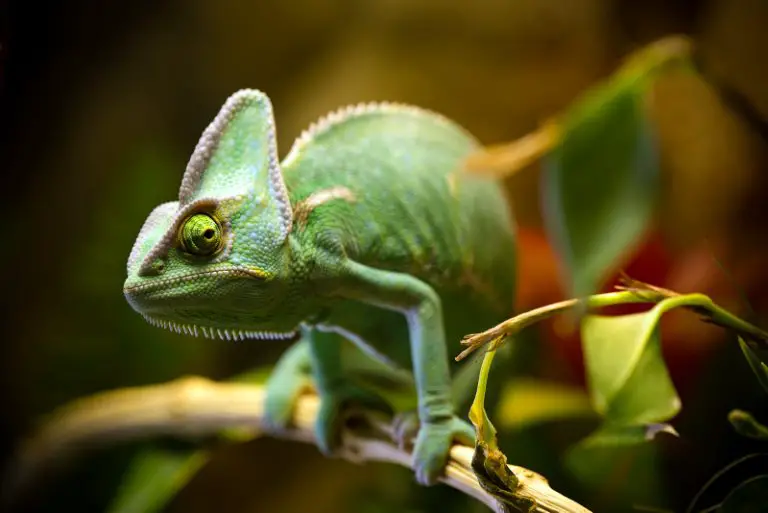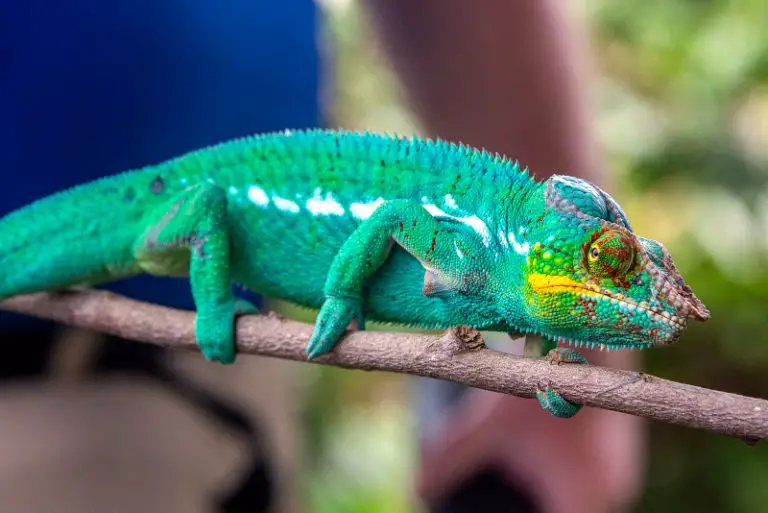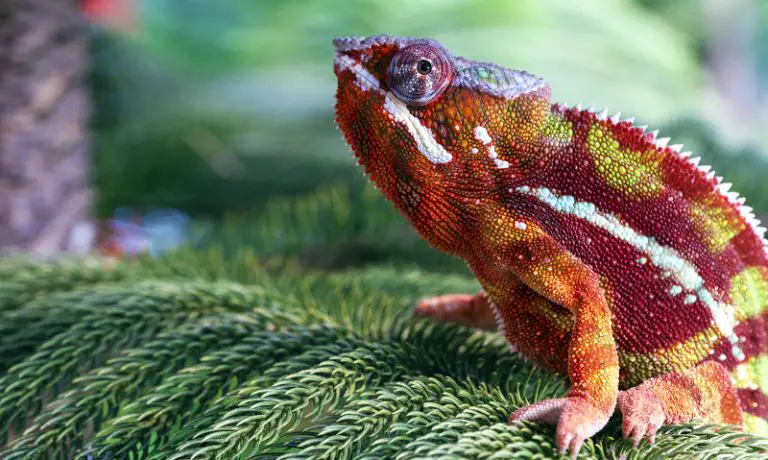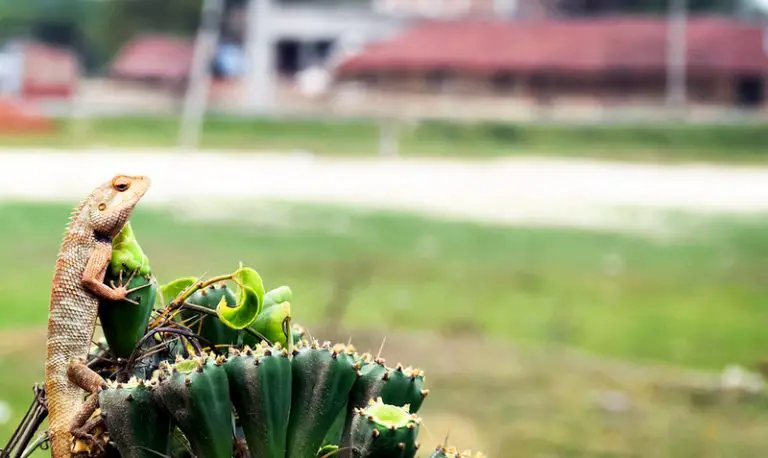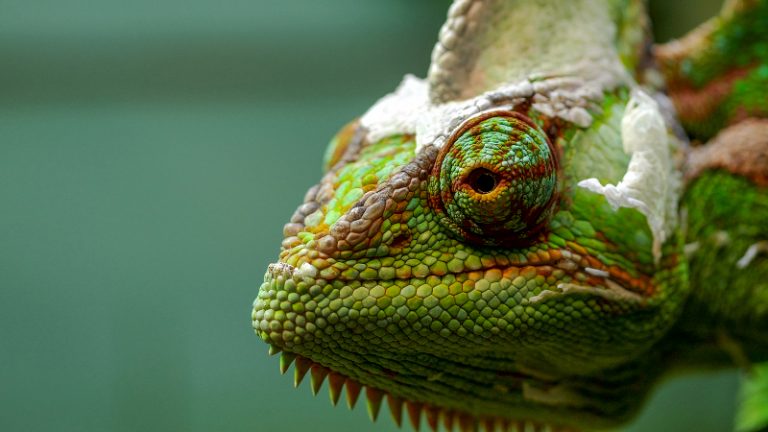Do Chameleons Smell Bad? [Smell Guide]
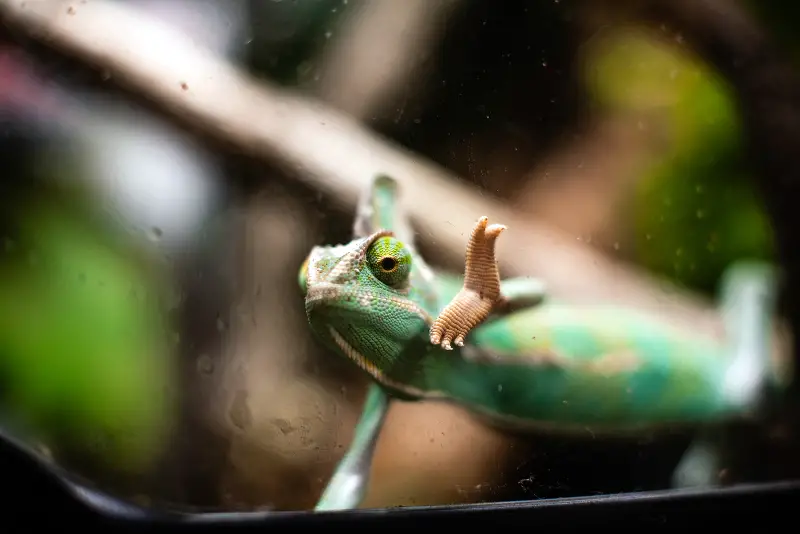
Many small animals can smell when they’re being kept inside a cage over time. However, is that the case for reptiles? Do Chameleons smell bad? In this article, we’ll answer that question and more. For example, we’ll share the few different ways that Chameleons can smell bad. Also, we’ll throw in some tips on preventing your reptile friend from smelling.

Contents
Table of Contents
Do Chameleons Smell Bad?
The short answer is no. Chameleons do not smell bad.
However, other things can smell bad, making it seem like your Chameleon has an odor to them. These causes can come from the following:
- Your Chameleon’s Environment
- Your Chameleon’s Excrement
- Your Chameleon’s Natural Behavior
- Your Chameleon’s Poor Health
Some of these ways are preventable, and others are not. For the most part, though, you’ll be able to control whether your Chameleon smells up the room or not.
So, since we know that Chameleons themselves don’t necessarily smell, let’s talk about the causes that actually create an odor.
Does Chameleon Poop Smell?
Yes, Chameleon poop does smell. The smell may get worse if it builds up over time and isn’t cleaned out of the cage right away.
For instance, if poop builds up inside the enclosure, then your Chameleon is more than likely to walk all over it. Thus, they get poop all over themselves and all over the rest of their habitat.
In addition, as stated above, their enclosure should be misted often every day. If poop is left out, then the water from the misting will turn it into a messy puddle, making it smell worse. Then, it’ll also be that much harder to clean it up later.
Aside from the smell, this will make your Chameleon extremely unhappy and stressed. If they begin to get stressed, your Chameleon could become aggressive toward you.
Don’t get upset that your Chameleon is aggressive if this should happen. Instead, take note of it and recognize what the problem is. For example, if the cage is too dirty, clean it and see how it affects your Chameleon’s mood.
For example, you can spot-clean your Chameleon’s tank at least once a day. Then, make sure their waste is cleaned up as best as possible and as soon as you can when your Chameleon goes to the bathroom.
Do Chameleon Cages Smell?
There are a few things within your Chameleon’s cage that might make it smell. Since you want to mimic their habitat as best as possible, there are a few things inside their enclosure that might make it smell.
And, of course, since their enclosure is small and they’re within a smaller room, rather than the open wild, the smell may seem stronger.
So, the first cause is the floor or substrate you use.
The Substrate Or Flooring Of The Enclosure
You don’t need to use flooring inside your Chameleon’s cage, but if you want to make it look as natural as possible to them, you might use substrate. Depending on the type of soil or substrate you use, this can cause an odor over time.
For instance, some substrate has manure or chicken excrement within it. So when your Chameleon walks on it or rolls in the substrate, then they get the smell on them.
Water Inside Your Chameleon’s Enclosure
Believe it or not, another cause of odor within your Chameleon’s enclosure is standing water. Your reptile needs water at all times for them to stay hydrated. However, they don’t drink water as we do.
For example, you’ll need a drip system or to mist their enclosure a few times a day.
Learn more about what a drip system is for Chameleons here.
Standing water can create a musty smell if it’s in there for too long. It might also absorb into your Chameleon’s skin, thus giving them a musty smell as well.
To avoid this, make sure the enclosure is completely dried out before the next misting. Otherwise, some spots inside the cage will never be dry.
There May Be Root Rot In Your Chameleon’s Enclosure
Another cause of smelling within their cage might be root rot. Similar to the cage being moist all of the time, water can cause the decor to smell.
For example, if you have live plants inside their cage, they might get overwatered from the misting and from watering them to keep them alive.
Too much water can cause root rot, which makes the plant smell.
Having live plants is a good idea for your Chameleon since it will well mimic their natural habitat. However, artificial vines and fake plants work just as well.
Why Do Chameleons Smell?
Chameleons don’t technically smell on their own. It’s the things around them that smell. However, there is a couple of ways that Chameleons can cause an odor themselves.
Chameleons Can Store Food In Their Mouths
Chameleons have pockets inside their mouths that allow them to store food. In the wild, they’re able to store uneaten meat and smear it on tree branches and other spots to attract prey.
Then, when the prey comes to have a snack, the Chameleon will strike with their tongue.
There’s no reason for Chameleons to store meat within their mouths when in captivity. There’s no prey for them to catch since you’re the one feeding them on a schedule.
However, even though your Chameleon knows this, it’s a natural instinct for them to store food in their mouths, so they’ll do it anyway.
The problem is that they won’t smear it on anything in their enclosure because they know there’s no prey to catch. That’s nice for you since you don’t need to clean it, but it will cause your Chameleon to smell.
Unfortunately, you can do nothing about this because it’s a simple natural behavior for your reptile.
Your Chameleon May Be In Poor Health
One sign that your Chameleon isn’t feeling well isn’t getting the nutrition they need or doesn’t have the proper living conditions within their habitat is that they’ll begin to smell.
For example, they begin to die if they’re malnourished or don’t have the proper lighting. Sometimes, they’ll smell as though they’re decomposing while they’re still alive.
If this happens to your Chameleon, you’ll want to bring them to the vet right away and find the cause of it as soon as possible.
Also, if your Chameleon has parasites or they’re dehydrated, that can cause an odor as well. There are other signs, too. So, if your reptile is feeling lethargic or has dry, flaky skin, then that’s a sign something is off. You should be able to catch that they’re not feeling well before they begin to smell.
How To Prevent Chameleons From Smelling?
There are multiple ways to prevent Chameleons from smelling.
First, make sure that the enclosure is clean at all times. You’ll want to spot-clean it at least once a day to ensure the water isn’t damaging anything inside the cage and also to clean up any poop that’s lying around.
When it comes to your Chameleon storing food, there’s nothing you can do about that, unfortunately. However, you can make sure that everything inside their enclosure is correct.
For example, make sure the day, night, and basking area temperatures are correct. Also, make sure your Chameleon is eating and that they’re eating their food within a timely manner.
These are ways to ensure that your Chameleon is doing well and in good health, so they don’t begin to smell.
In other words, the best way to prevent them from smelling is to keep their enclosure clean and to make sure they’re properly cared for.
Can Chameleons Smell Themselves?
Chameleons have a sense of smell, but it’s not very good. In addition, this reptile cannot sweat, so they release excess salt from their body through their nostrils. It’s not known whether Chameleons can smell each other or not or whether they can even smell themselves.
Conclusion
Overall, Chameleons themselves are a pretty clean pet to have. They don’t have an odor that comes from them, but there are other ways they can smell.
The best way to prevent such odors is to keep their enclosure as clean as possible at all times. Otherwise, if you smell rotting meat, then chances are your Chameleon is hoarding food, and there’s nothing you can do about that.
Learn more about Chameleons in all our guides here or click here to find out what Chameleons eat or here to find out if they are dangerous. You can also find out if Chameleons have teeth here and whether they are easy to care for here.

![How Often Do Veiled Chameleons Eat? [Full Eating Guide]](https://allourcreatures.com/wp-content/uploads/2021/12/veiled-chameleon-768x508.jpg)
